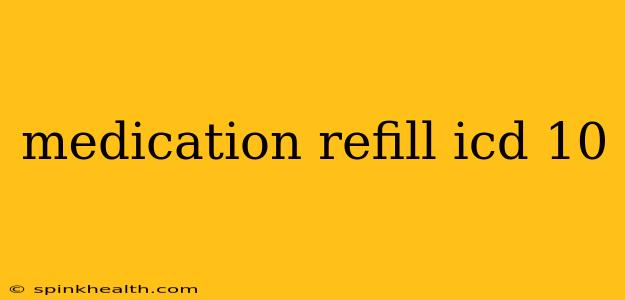The ICD-10 Codes Behind Your Medication Refills: A Patient's Guide
Getting your prescriptions refilled is a routine part of managing chronic conditions or taking medication for a specific ailment. But have you ever wondered about the hidden codes – the ICD-10 codes – that accompany this process? These aren't secret agent numbers; they're a vital part of medical billing and record-keeping, offering crucial information about your health. Let's unravel the mystery behind them.
This isn't just about numbers; it's about understanding how your healthcare information is tracked and used to improve your care. Think of ICD-10 codes as a detailed language that doctors and insurance companies use to communicate precisely about your health. Instead of vague descriptions, they use specific codes to clarify the reason for your medication.
What are ICD-10 Codes?
ICD-10 stands for International Classification of Diseases, Tenth Revision. It's a complex system of alphanumeric codes used worldwide to classify diseases and other health problems. These codes are essential for tracking disease prevalence, conducting epidemiological studies, and, crucially, for healthcare billing. When you refill your medication, the code associated with the reason for the medication is used to process your claim with your insurance provider.
Imagine this scenario: You're refilling your blood pressure medication. The code used won't simply be "high blood pressure." Instead, it might be something more specific like I10 (Essential (primary) hypertension) which provides more detailed information to your insurance company and allows for more effective data analysis in healthcare.
Why are ICD-10 Codes Used for Medication Refills?
The use of ICD-10 codes for medication refills serves several crucial purposes:
- Accurate Billing: The correct code ensures that your insurance company understands the medical necessity of the medication, leading to smoother claim processing.
- Tracking Disease Prevalence: By collecting data on the diagnoses associated with medication refills, healthcare professionals can monitor the prevalence of various diseases and conditions within a population. This data informs public health strategies and resource allocation.
- Research and Analysis: The consistent use of ICD-10 codes allows for large-scale epidemiological studies to identify trends and improve healthcare outcomes.
- Quality of Care: Analyzing the diagnoses and medications prescribed helps healthcare providers identify areas for improvement in patient care.
What ICD-10 Code Will Be Used for My Medication Refill?
This is the crucial question, and unfortunately, there's no single answer. The specific ICD-10 code used will depend entirely on your diagnosis. Your doctor determines the appropriate code based on your medical history, symptoms, and examination findings. Some examples include:
- Diabetes: Several codes exist depending on the type of diabetes (e.g., Type 1, Type 2, gestational).
- Hypertension: Again, different codes exist depending on the type and severity of hypertension.
- Asthma: Different codes exist depending on the severity and type of asthma.
- Mental Health Conditions: Numerous codes exist for various mental health disorders.
How Do I Find Out What ICD-10 Code Is Used for My Medications?
You usually won't see the ICD-10 code directly. It's primarily used for billing and record-keeping by your doctor and insurance provider. However, you can always ask your doctor or pharmacist for more information if you're curious about the codes used in relation to your treatment. They are trained professionals and can provide a better understanding of how your data is used.
Are there specific ICD-10 codes just for medication refills?
No, there aren't specific ICD-10 codes solely for medication refills. The code used reflects the underlying medical condition or reason for the medication, not the act of refilling the prescription itself. The refill is a consequence of the diagnosis, and that diagnosis is what gets coded.
What happens if the wrong ICD-10 code is used?
Using the incorrect ICD-10 code can lead to claim denials from your insurance company or delays in processing. It's important for accurate and efficient healthcare billing that the correct code reflecting your diagnosis is used.
This deep dive into ICD-10 codes related to medication refills demonstrates their importance in the healthcare system. While you may not need to memorize these codes, understanding their function allows you to participate more fully in your healthcare and appreciate the intricate processes involved in managing your health. Remember, always consult your doctor or pharmacist for specific questions about your medications and health information.

